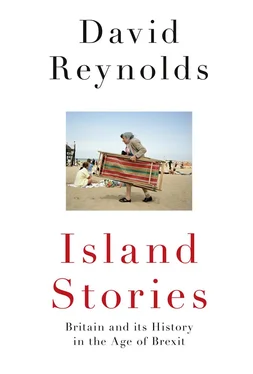The Gunpowder Treason Plot became even more sacred to Protestant memory during the reign of the crypto-Catholic Charles I and the Wars of the Three Kingdoms. Charles’ attempt to impose an Anglican prayer book on the Scottish Presbyterian church provoked the so-called Bishops’ Wars of 1639–40. In an effort to put down the Scottish revolt, the King tried to raise an army of Irish Catholics, which deepened suspicions that he was a Papist. Finally obliged to call Parliament in London into session, after more than a decade, in order to obtain money for the Scottish war, Charles was confronted by a long list of civil and religious grievances from a legislature that voted itself into permanent session (the ‘Long Parliament’) until its demands were met. Deadlock turned into confrontation and then three English civil wars between 1642 and 1651, which were intertwined with the politico-religious struggles in Scotland and Ireland.
Charles was executed in 1649 and although his son regained the throne in the Restoration of 1660 as Charles II, he returned to a country permanently changed by the civil wars. England was now firmly established as a constitutional monarchy committed to a Protestant church. So much so that when Charles’ brother and successor, James II, turned to Catholicism, he was displaced in 1688 in favour of his Protestant daughter, Mary, and her Dutch Calvinist husband William of Orange. After Mary died in 1694, ‘King Billy’ reigned alone until his death in 1702. The year before, a parliament dominated by Tory squires passed the Act of Settlement, prohibiting a Catholic (or anyone married to a Catholic) from acceding to the throne. This was no ritual act of piety. In 1707, ensuring the Protestant succession throughout Britain was a major reason for the Anglo–Scottish Treaty of Union, which established a new constitutional entity, Great Britain. And in 1714, when Queen Anne (Mary’s younger sister) died without a living heir, Parliament passed over more than fifty individuals closer to her in blood yet Papist in faith. Instead they invited Georg Ludwig, Elector of Hanover – barely able to speak English but a staunch Lutheran – to be crowned King George I. [17] Конец ознакомительного фрагмента. Текст предоставлен ООО «ЛитРес». Прочитайте эту книгу целиком, купив полную легальную версию на ЛитРес. Безопасно оплатить книгу можно банковской картой Visa, MasterCard, Maestro, со счета мобильного телефона, с платежного терминала, в салоне МТС или Связной, через PayPal, WebMoney, Яндекс.Деньги, QIWI Кошелек, бонусными картами или другим удобным Вам способом.
In other words, to preserve England as a constitutionally affirmed Protestant nation it was considered an acceptable price, both in 1688 and also 1714, to call in a continental monarch.
The Protestant succession also brought with it renewed engagement with the Continent. By the 1680s France, under Louis XIV, had replaced Spain as Europe’s predominant Catholic power. Autocratic and aggressive, Louis and his successors sought to expand through enforced dynastic marriages and overt military conquest – a project seen by many in Britain as portending a ‘universal monarchy’. The French directly supported the son and grandson of James II in their bids to put the Stuarts back on the throne through invasions in 1715 and 1745. This threat forced Britain into continental alliances in the wars of 1689–97, 1702–13 and 1743–8 – waged to restrain French power.
In any case, the Protestant succession meant that Britain was itself a continental monarchy. Except for the twelve years of Queen Anne (1702–14), ‘from 1688 to 1837 the holder of the British thrones was simultaneously ruler of significant continental European territories’ – the United Provinces under William III and the Electorate of Braunschweig-Lüneburg under the Hanoverian dynasty. Although generally known as Hanover after its capital city, the Electorate actually covered much of north-central Germany – from Brunswick to Bremen on the North Sea, and from Göttingen to the edge of Hamburg. George I and George II were rulers of two separated territories and – retaining deep German roots – they took their continental obligations seriously, spending at least one summer in three in Hanover, together with key ministers usually headed by the senior Secretary of State. This pattern was broken only in 1760 with the accession of George III – the first Hanoverian to be born in Britain and to speak English as his mother tongue. Indeed he never visited Hanover during his sixty-year reign. [18] Конец ознакомительного фрагмента. Текст предоставлен ООО «ЛитРес». Прочитайте эту книгу целиком, купив полную легальную версию на ЛитРес. Безопасно оплатить книгу можно банковской картой Visa, MasterCard, Maestro, со счета мобильного телефона, с платежного терминала, в салоне МТС или Связной, через PayPal, WebMoney, Яндекс.Деньги, QIWI Кошелек, бонусными картами или другим удобным Вам способом.
The Hanover connection and the experience of fighting continental wars gave the eighteenth-century British political elite a keen awareness of Europe as a whole, both geographically and politically. This also discouraged insular isolationism. In 1716 the Earl of Sunderland asserted that ‘the old Tory notion that England can subsist by itself whatever becomes of the rest of Europe’ had been ‘justly exploded since the revolution’ of 1688. In 1742 the MP John Perceval ridiculed the idea ‘that this country is an island entrenched within its own natural boundaries, that it may stand secure and unconcerned in all the storms of the rest of the world’. The politician Lord Carteret insisted in 1744 that ‘our own independence’ was closely linked to ‘the liberties of the continent’. [19] Конец ознакомительного фрагмента. Текст предоставлен ООО «ЛитРес». Прочитайте эту книгу целиком, купив полную легальную версию на ЛитРес. Безопасно оплатить книгу можно банковской картой Visa, MasterCard, Maestro, со счета мобильного телефона, с платежного терминала, в салоне МТС или Связной, через PayPal, WebMoney, Яндекс.Деньги, QIWI Кошелек, бонусными картами или другим удобным Вам способом.
And setbacks against the French were often blamed on eighteenth-century equivalents of lack of willpower: luxury, selfishness, even an addiction to tea. ‘Were they the sons of tea-sippers’, asked the pamphleteer Jonas Hanway, ‘who won the fields of Cressy and Agincourt, or dyed the Danube’s streams with Gallic blood’ at Blenheim? [20] Конец ознакомительного фрагмента. Текст предоставлен ООО «ЛитРес». Прочитайте эту книгу целиком, купив полную легальную версию на ЛитРес. Безопасно оплатить книгу можно банковской картой Visa, MasterCard, Maestro, со счета мобильного телефона, с платежного терминала, в салоне МТС или Связной, через PayPal, WebMoney, Яндекс.Деньги, QIWI Кошелек, бонусными картами или другим удобным Вам способом.
Читать дальше












